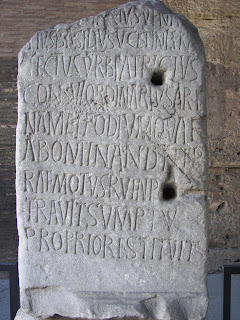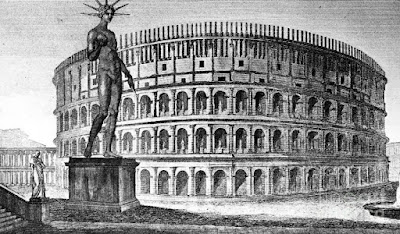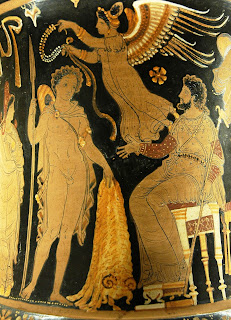 |
| Alexander and Darius |
With Alexander unable to use the terrain to his advantage, like at Issus or Granicus the odds seem firmly in Darius's favour, their are reports of the Persian forces flattening the terrain around the proposed battle field to give better running to their two hundred war chariots.
My sources tell me that there are around a million Persian forces, comprising of horse, infantry and fifteen terrifying war elephants (2) against the Macedonian force of seven thousand cavalry and forty thousand infantry. I can just make out the Persian line across the field and they are formed up in their standard line, King Darius himself stands at the middle of the line. The Macedonian forces have been split in two, with Alexander in charge of the right and the left flank under the command of Parmenion.
A hush has fallen upon the Macedonian forces and the king himself has just ridden by, it looks like orders have been given. Yes the army is advancing, although the wings of the army are at an angle. It looks as if Alexander is trying to draw the Persian cavalry out. Yes, he has set off with the Companion cavalry on an extreme flanking move, taking off far to the right (3).
It looks as if Darius is responding now and in a thundering noise of hooves the Scythian cavalry have come crashing into the right flank of the Macedonian army. It looks as if a fresh supply of men are being moved up and an agreement seems to have been reached in using tactical charges to clear the Persians from our lines (4).
The battle has been going for around half an hour now and in the haze to my right I can see scythed chariots being despatched to intercept King Alexander on his wide out-ride. However the hidden javelin throwers among the cavalry are making short work of them and few are breaking through to the Macedonian front line. I was recently shown an example of a new tactic by the Macedonian forces and here it is in practice. The disciplined lines are opening up creating avenues which the enemy scythed chariots are simply passing through.
It looks as if King Alexander is preparing his final move. With his army engaged at the front and with reports that the left flank is suffering, a gap as formed in the Persian ranks as they have slowly moved around trying to flank the King and his cavalry. I can see he has formed his troops into a mighty wedge, and the sun glinting off his armour clearly shows me Alexander will be leading this charge himself (5).
They are lost to me in the dust of their horses hooves churning the plain, but I can hear the sound of the cavalry crashing into the Persian line.
A runner has just arrived from the left wing of the army requesting aid against the Persians. At the same time a man on a horse has just arrived from the charge. The wedge of the cavalry smashing into the weak Persian forces have scattered them, King Darius himself is in danger of being caught as his army is in full flight (6). Apparently runners have been sent to Alexander directly to request aid for the left flank and I can see the king is breaking off his pursuit of Darius and moving his troops to the left flank.
The battle seems far from over and the wounded and injured are being brought in to the camp, Hephaestion himself just passing me, however it is another stunning victory for the young King Alexander and one can only wonder where this man and his army will achieve next. Babylon seems a ripe target and it is my belief that my next report will be from beside the fertile plain between the Tigris and Euphrates"
1. "wrote to Alexander advising his to bear his success as one who was only human and to release the captives in return for a large ransom. He added he would yield to Alexander the territory and cities of Asia west of the Halys river " Diodorus Siculus Book 17 Chapter 39.
2. "He marched against Darius, who was coming to meet him with a million men" Plutarch Life of Alexander Chapter 31.
3.
4. "The Macedonians sustained their assults, and assailing them violently squadron by squadron, they succeeded in pushing them out of rank" Arrian Book 3 Chapter 13
5. "the Macedonian cavalry, commanded by Alexander himself pressed on vigarously, thrusting against the Persians" Arrian Book 3 Chapter Fourteen
6. "the cavalry charged at full speed upon the enemy and the phalanx rolled on after them like a flood. But before the foremost ranks were engaged the Barbarians gave way" Plutarch Life of Alexander Chapter 33
Thanks for Reading
James




























